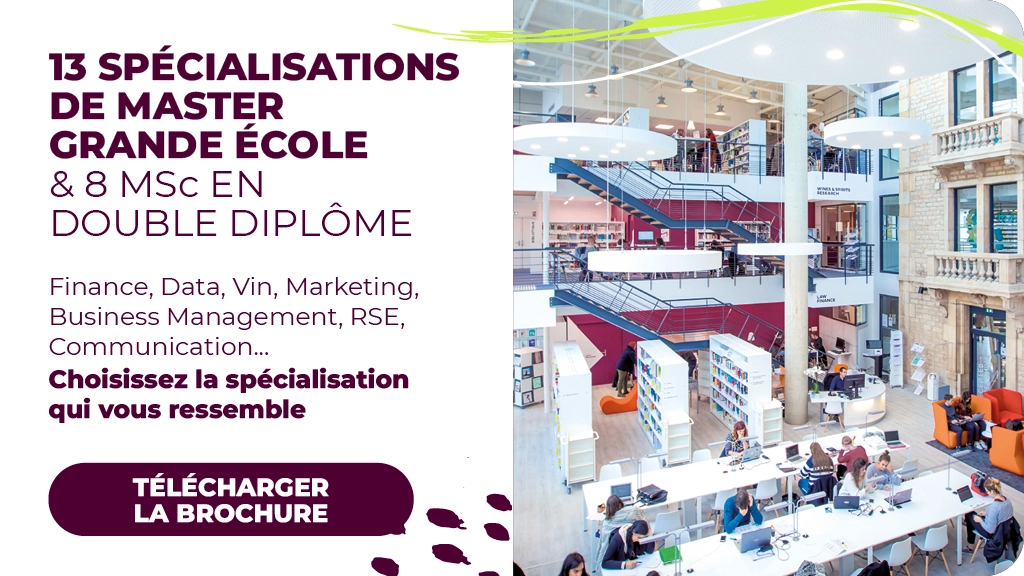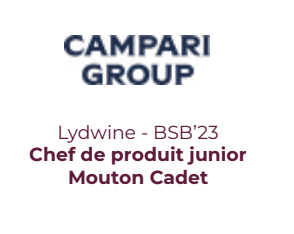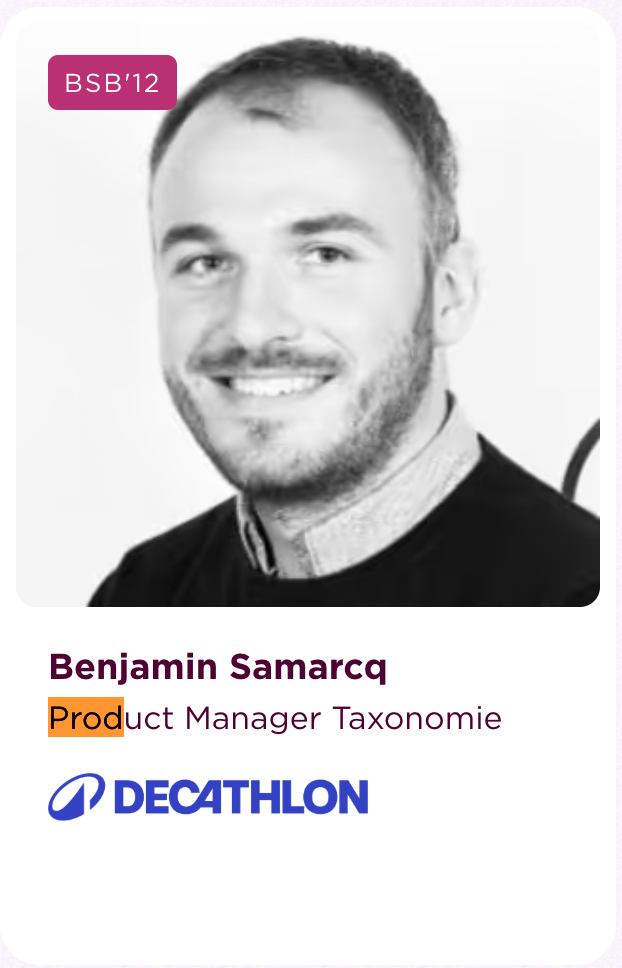How do I become a product manager? Tomorrow's successful product strategist

NB: For reasons of readability and fluidity of the text, we use the term “product manager” in this article. This name obviously includes the functions of product manager. At BSB, we believe in equal talent and opportunities, regardless of gender, background, or identity.
Do you dream of launching a product that will become a success, of imagining its strategy, of managing its launch and of monitoring its results? That is exactly the role of product manager : to transform an idea into reality. Imagine yourself in a meeting, an entire team is waiting for your guidance. You present a new product, from positioning to design, from the creative brief to the digital campaign. Every decision counts, and you're in the driver's seat. But how do you get there? What skills, what studies, what steps to build such a career? This guide shows you everything you need to chart your own path.
What does the job of product manager consist of?
Project yourself in this position in the future: You work in a globally recognized company. You are being given a product that is not very attractive at first glance. You are going to tell her story, find The promise that will speak to consumers, the message that will hit the mark, the packaging that catches the eye, the right distribution channel to ensure a successful launch. The role of product manager It's turning an idea into a success, and sometimes an ordinary product into an essential that everyone can't get hold of. The success of a launch depends on your ability to analyze, create, convince and coordinate.

The main missions of the product manager
As a product manager, you need to make sure that the market adopts your product and that it becomes a must. Concretely, you:
- Analyze the market and consumer expectations,
- Imagine an attractive offer,
- Translate this vision into concrete actions (briefs, digital campaigns, communication materials),
- Manage results and adjust your decisions,
- Prepare for the future, by anticipating changes in the range or the market.
The skills needed to succeed
Becoming a product manager isn't just about having ideas: it's knowing how to turn them into concrete successes. Each skill you develop is an additional weapon to bring your projects to life.
Among the essentials:
- Analyzing a market and its trends to anticipate needs and understand what will thrill consumers.
- Mastering project management to plan, coordinate, meet deadlines and budgets for the launch to be a success.
- Use digital and data tools to make informed and quantified decisions (Excel, Google Analytics).
- Exploiting artificial intelligence such as predictive analytics, automation or even generative AI to accelerate intelligence, test ideas and innovate more quickly.
- Understanding digital marketing to give visibility to your products (social networks, SEO, multi-channel campaigns).
- Speak English fluently because markets, like your products, cross borders.
📌 These skills are cultivated as soon as you study, thanks to internships, apprenticeships and real projects and real projects offered in business schools such as BSB.
The soft skills of a product manager
Technical skills open the doors to the profession. But what will make you one recognized product manager, these are your human qualities: those that allow you to embark a team, convince management and bring your vision to life.
- Curiosity to stay on top of trends, catch weak signals, and stay ahead of the curve.
- Creativity by finding the right words for a future campaign that will make an impression, which will then be available on multiple media such as packaging.
- Relational meaning to unite different profiles (designer, commercial, legal) around the same project.
- Analytical spirit to make informed decisions based on data.
- Resilience to bounce back after a failure, adjust and restart, until you find the right target.
In summary, the product manager is a creative leader able to transform an idea into shared success.

What studies to become a product manager?
To become product manager, above all, you must choose a course that gives you the right foundations in marketing, management and market analysis. After the baccalaureate, several options exist, but not all offer the same level of specialization or the same international opportunities. The main thing is to find a course that combines skills, concrete experiences and openness to the world.
Possible courses after the bac
After the baccalaureate, several paths allow you to approach marketing and business: BTS, BUT or Bachelor's degree at the university. These courses provide solid foundations, but often remain general and oriented towards operational jobs.
If you want to move directly into a career of product manager, a business school will allow you to develop a more strategic and professional vision. At BSB, two Bachelors open up different perspectives:
- The Bachelor in Management : a comprehensive curriculum that trains you in the fundamentals of management, marketing, finance and management. Ideal for keeping an eye on several jobs before specializing, it prepares you for a career in project management and opens the way to positions of responsibility, in particular as a marketing or digital product manager.
- The Bachelor Media, Culture & Communication : a course for people who are passionate about communication, culture and creative industries. Here you explore media, cultural marketing, and strategic communication, ideal for becoming a product manager in culture, entertainment, or creative brands.
These two Bachelors share the distinctive assets of BSB:
- Courses in human-sized classes,
- Of thealternation And internships to enhance your CV,
- One International openness, with more than 200 partner universities around the world,
- One personal and professional 360° coaching unique to build your project step by step.
📌 The integration into the Bachelor's degree at BSB is done via the BSB Bachelor competition upon Parcoursup. Of parallel admissions are also possible in 2nd year (after a Bac+1) or in 3rd year (after a Bac+2) thanks to the Footbridge competition.
💡 Do not overlook the role of career counsellors: at BSB, our coaches support you to clarify your projects and build a career path aligned with your ambitions.
Long studies: the Bac+5 course in business school
To access a position of product manager, Bac+5 remains the safest route. In business school, it allows you to acquire advanced skills in marketing and management, but also to multiply professional and international experiences. At BSB, you have several options for building a tailor-made course.
The Grande École Master as an initial or work-study program
It is the flagship training for those who wish to become product manager. The Master Grande École from BSB consolidates your management fundamentals, while specializing in Marketing & Communication Or in Communication & Events.
You can follow this course in alternation over 12 or 24 months. More than 1,500 offers are offered each year by our partner companies (Decathlon, Danone, Puma, Pernod Ricard, Moët & Chandon, etc.) for finance your studies and enhance your resume.
📌 The Master Grande École is accessible after a Bac+3 via the Footbridge competition. Depending on your background, you can integrate directly into Master 1 or go through a Pre-master, a year of upgrading that consolidates your achievements and facilitates the transition to specialization.

Choosing a double degree
In initial training, you can aim for a double degree from the 2nd year of the Grande École Master. BSB offers several options in France and abroad, such as the MSc Media, Culture & Communication (Lyon), the MSc Luxury Management & Innovation (Dijon) or partnerships with Northumbria University (United Kingdom) and the LUISS Business School (Italy). For a future product manager, these double degrees are an opportunity to develop complementary expertise (data, communication, luxury, sustainable management, wines and spirits) and to strengthen their profile on a very competitive international market.
The Specialized Master
BSB also offers Specialized masters to develop expertise in a specific sector:
- the Specialized Master in International Wine & Spirits Trade (MS CIVS), focused on the international trade in wines and spirits,
- the Specialized Master in Management of Cultural Enterprises and Creative Industries (MS MECIC), dedicated to the management of cultural and creative industries.
These backgrounds provide a strong legitimacy to evolve as a product manager in specific worlds (luxury, digital, culture, wines, etc.). In summary, relying on a professional and strategic curriculum with BSB means accelerating your evolution towards positions of responsibility.
Salary and career development for a product manager
Average earnings
The salary for a product manager depends on experience, industry, and company. At the beginning of his career, a junior product manager perceive between €32,000 and €38,000 gross per year (i.e. around 2,700 to 3,200€ gross per month). With a few years of experience, the remuneration increases rapidly: a confirmed profile achieved 45,000 to 55,000€, and in very competitive sectors such as Digital, luxury or mass consumption, it can exceed €60,000 gross per year.
Career development to strategic positions
The job of product manager is a real springboard. After 3 to 5 years, it is common to evolve into a position of group leader, then marketing manager, before accessing functions of marketing director Or of Brand Manager International. This progression is facilitated by a solid career in business school. Recruiters particularly value a recognized diploma Like a Master Grande École (master's degree), of concrete experiences (internships, apprenticeships, projects) and the ability to learn from each mission.
Our Alumni have become Product Managers


FAQ - Your frequently asked questions about being a product manager
1. Do you need a Bac+5 to become a product manager?
A Bac+5 is not mandatory, but it promotes rapid access to strategic positions. Recruiters are primarily looking for profiles frombusiness schools Or of Specialized masters in marketing and communication. These courses provide the strategic vision, practical experiences (internships, apprenticeships) and international openness that make the difference.
2. How do you build a product manager portfolio?
Even if the job is less “visual” than that of a creative person, a portfolio can differentiate you from other candidates by presenting:
- Student projects (fictional launches, market studies, business cases),
- Internship or work-study experiences (campaigns, market analyses, results obtained),
- Personal initiatives (sector monitoring, associative projects, digital creations).
It is a concrete way to show your know-how and your ability to manage a project from A to Z. At BSB, students build their portfolio as early as the Bachelor.
3. Do you have to master AI to be a product manager?
AI is not essential, but it is a major asset. Predictive analysis, automation, monitoring or prototyping: using it means taking a step ahead of the market in which you will operate.
AI is becoming an essential asset to accelerate your intelligence, test ideas or refine your decisions: predictive analysis, automation, monitoring, prototyping... Those who know how to integrate AI into their professional practice are clearly taking a step ahead.
4. Is it necessary to speak several languages to succeed?
English is essential: product sheets, briefs to agencies, exchanges with international teams... you will be required to use it on a daily basis. Speaking another language (Spanish, German, Mandarin...) can also be a real plus, especially if you are considering an international career.
5. What are the advantages of this job?
As a product manager, you juggle creativity, analysis, and management. Preparation of a product launch, coordination of teams, monitoring the results. You watch your ideas come to life in the marketplace. A unique experience that quickly leads to positions of responsibility.
*Sources: Apec





To remember